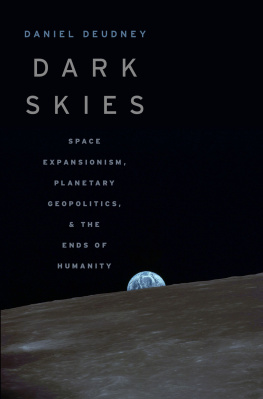Daniel Deudney - Dark Skies
Here you can read online Daniel Deudney - Dark Skies full text of the book (entire story) in english for free. Download pdf and epub, get meaning, cover and reviews about this ebook. year: 2020, publisher: Oxford University Press, genre: Religion. Description of the work, (preface) as well as reviews are available. Best literature library LitArk.com created for fans of good reading and offers a wide selection of genres:
Romance novel
Science fiction
Adventure
Detective
Science
History
Home and family
Prose
Art
Politics
Computer
Non-fiction
Religion
Business
Children
Humor
Choose a favorite category and find really read worthwhile books. Enjoy immersion in the world of imagination, feel the emotions of the characters or learn something new for yourself, make an fascinating discovery.
- Book:Dark Skies
- Author:
- Publisher:Oxford University Press
- Genre:
- Year:2020
- Rating:4 / 5
- Favourites:Add to favourites
- Your mark:
- 80
- 1
- 2
- 3
- 4
- 5
Dark Skies: summary, description and annotation
We offer to read an annotation, description, summary or preface (depends on what the author of the book "Dark Skies" wrote himself). If you haven't found the necessary information about the book — write in the comments, we will try to find it.
Dark Skies — read online for free the complete book (whole text) full work
Below is the text of the book, divided by pages. System saving the place of the last page read, allows you to conveniently read the book "Dark Skies" online for free, without having to search again every time where you left off. Put a bookmark, and you can go to the page where you finished reading at any time.
Font size:
Interval:
Bookmark:


Oxford University Press is a department of the University of Oxford. It furthers the Universitys objective of excellence in research, scholarship, and education by publishing worldwide. Oxford is a registered trade mark of Oxford University Press in the UK and certain other countries.
Published in the United States of America by Oxford University Press
198 Madison Avenue, New York, NY 10016, United States of America.
Oxford University Press 2020
All rights reserved. No part of this publication may be reproduced, stored in a retrieval system, or transmitted, in any form or by any means, without the prior permission in writing of Oxford University Press, or as expressly permitted by law, by license, or under terms agreed with the appropriate reproduction rights organization. Inquiries concerning reproduction outside the scope of the above should be sent to the Rights Department, Oxford University Press, at the address above.
You must not circulate this work in any other form and you must impose this same condition on any acquirer.
CIP data is on file at the Library of Congress
ISBN 9780190903343
eISBN 9780190903367
To John Steven Welch, North Star
Stretching over many years, my thinking about space has been shaped by conversations with John Agnew, Bentley Allan, Peter Andreas, Jane Bennett, Wayne Biddle, Lester Brown, Barry Buzan, Luis Cabera, Arthur Clarke, Joseph Coates, Campbell Craig, Leonard David, Ron Deibert, Everett Dolman, Richard Falk, Peter Garretson, Nadivah Greenberg, Jairus Grove, John Logsdon, Tim Luke, Allyn McAuley, John McLucas, Beth Mendenhall, Zia Mian, Craig Murphy, Ethan Nadelmann, Michael Neufeld, John OLooney, Scott Pace, Columba Peebles, Benoit Phelopidas, John Pike, Shane Pinkston, Robert Poole, Carol Rosin, Carl Sagan, Si Sheppard, Harlan Smith, Warren Tucker, Frank von Hippel, Ole Waever, Karl Walling, Wesley Warren, Alex Wendt, Jim Wirtz, and the students in my Politics of Outer Space course at Johns Hopkins University.
Valuable research assistance has been provided by Michael Byrne, Mason Cole, Kiernan Coleman, Zackery David, Kenny Eaton, Jacob Grunberger, Beckett Jackson, Ethan Landis, Ian Maddox, David Oh, Wang Jae Rhee, David Saveliev, Greg Sgammato, Yi Su, and Sunil Vaswani. Special thanks to Mason Cole for checking numbers and calculations.
Helpful comments on earlier versions of the manuscript were provided by Bentley Allan, Barry Buzan, Zackery David, Ron Deibert, Everett Dolman, Namrata Goswani, David Hendrickson, Joan Johnson-Freese, Daniel McCarthy, Beth Mendenhall, Clay Moltz, Sebastian Mazzaca, James Thompson, Phil Torres, and anonymous reviewers for Oxford University Press
This project has also benefitted from comments on earlier versions of this argument presented at panels at the International Studies Association, Toronto (March 2019), Baltimore (February 2017), Atlanta (March 2016), Toronto (March 2014), San Francisco (April 2013), and New Orleans (February 2010); the Naval Postgraduate School, Monterey (May 2016); Department of Political Science, Johns Hopkins University (April 2015); School of Advanced International Studies, Johns Hopkins University (April 2014); Department of International Relations, Graduate Institute, Geneva (December 2013); Danish Academy of Sciences and the University of Copenhagen (December 2013); Spruce Hill Atheneum, Philadelphia (July 2013); University of Copenhagen (June 2013); the Watson Institute, Brown University (March 2013); Program in Peace and Conflict Studies and the Institute for Space Policy Studies, George Washington University (May 2012); Jackson School of Public Policy, University of Washington (April 2011); Munk School, University of Toronto (February 2011); Peace and Conflict Studies Program, Colgate University (October 2010); Convention of the American Political Science Association, Washington, DC (September 2010); Department of Political Science, University of Frankfurt (July 2010); Eisenhower Center for Space Strategy, United States Air Force Academy (December 2009); Department of Political Science, Colorado College (October 2001); University of British Columbia, Institute of International Relations (July 1996); Program on Nuclear Policy Alternatives, Center for Energy and Environmental Studies, Princeton University (June 1985); United States Senate Foreign Relations Committee (May 1983); and the UNISPACE Conference, Vienna, (June 1982). Very early versions of the arguments of chapter seven appear in my MA thesis, supervised by John Logsdon at the Program in Science, Technology and Public Policy, George Washington University, were presented at workshops on space cooperation at the Space Science Institute, Moscow (September 1988), and were published in the World Policy Journal, Foreign Policy, Bulletin of the Atomic Scientists and studies published by the WorldWatch Institute.
Special thanks to the editorial team at Oxford University Press and Newgen KnowledgeWorks, David McBride, Holly Mitchell, and Liz Davey, whose support and expert editing have been invaluable. Generous financial support for this project was provided by the Nadivah Philanthropic Fund in Memory of Barbara Feinstein. This project would not have been possible without the support, encouragement and tolerance from the members of my family, Ruth Deudney, Holly McGarragh, Heidi Deudney, Robert Slater, and especially John Welch.
On a steady diet of accelerating technology, strategic weapons have outgrown their traditional arenathe earth.
Robert Salkeld (1970)
Humans are sprung from the Earth, have never lived anywhere but on Earth, and the features of this planet have shaped every aspect of human life. Over the past several centuries, and accelerating across the twentieth, the practical human relationship with the Earth has profoundly changed. Advances in natural science and technology, the globalization of a machine-based civilization, and the possibilities of planetary-scope technological catastrophes have combined to produce a radically novel and deeply unsettled human historical situation. In perhaps the most audacious and spectacular thrust of technological civilization, humankind took the first steps in the middle years of the twentieth century toward becoming an outer spacefaring species by venturing out of the Earths atmosphere and into the edges of the stupendous vastness of cosmic space.
Humans have always lived on a globe-shaped planet, but only recently have human activities become significantly global and planetary in their scope. The decisive root, widely recognized, of this far-reaching change is the superior human ability to make and employ tools with progressively increasing capabilities. Among the billion or so species of complex life that have existed on Earth, Homo sapiens is distinguished by a package of sociobiological attributes (most notably language and prospection) that have enabled humans to fabricate and instrumentally employ tools, which now exist in astounding numbers and varieties. Across the past several centuries, the pace of scientific discovery and technological development has greatly accelerated, producing a worldwide human civilization that makes and operates machines and systems of machines with increasing power, spatial scope, and complexity. Possibilities for technological advance are far from exhausted, and the commitment to technological progress is deeply entrenched.
The expansive trajectory of machine-based civilization that seems to lead to the stars has already transformed the physical features of the Earth by permitting vast increases in the number of humans, expanding the impacts of their activities, and altering habitats to make them more useful for human needs and wants. Humankind has disrupted, exploited, and managed large parts of nature, constructed vast complexes of built and enclosed spaces, and deployed networks of machines spanning the planet. This exceptional human ability to make and use ever more capable tools has radically transformed the human estate, propelling initially tiny human populations, living a precarious animal existence at the edge of extinction, into a presence large enough to reshape major features of the Earths ecology and geology.
Font size:
Interval:
Bookmark:
Similar books «Dark Skies»
Look at similar books to Dark Skies. We have selected literature similar in name and meaning in the hope of providing readers with more options to find new, interesting, not yet read works.
Discussion, reviews of the book Dark Skies and just readers' own opinions. Leave your comments, write what you think about the work, its meaning or the main characters. Specify what exactly you liked and what you didn't like, and why you think so.











